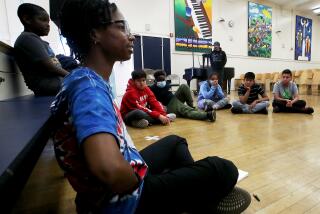Finding Balance in Schools
- Share via
A shortened school calendar. Children encouraged to create more and think up their own projects. A move away from high-stakes testing in public schools and toward fostering “zest for living.” More local control over what students learn and when. This seemingly 1970s-vintage recipe is a tsunami of change for Japanese public schools--the very schools that reformers in the U.S. had held up as a model of academic rigor and emphasis on basics.
As it turns out, while American parents and businesses have been fretting about kids who aren’t gaining the academic skills needed to succeed in global markets, Japanese parents and businesses have been worried about teen stress and suicide, soaring dropout and truancy rates and a lack of the creativity needed to succeed in global markets. The full slate of reforms started this school year, which in Japan means back in April. As outlined in Education Week, the biggest change has been to shrink the school week from six days to five. The national requirement for what students must learn each year also shrank by almost a third. And a new study period allows students to set up their own courses in nontraditional subjects, such as the environment or ethnic diversity.
There’s a lesson in all this for school reformers on both sides of the Pacific. Education clings to an ever-swinging pendulum: The vogue is phonics, then whole-language reading instruction, now phonics again. The same for interdisciplinary learning, dress codes and lockers: Now you see them, now you don’t.
This doesn’t mean the time has come for American schools to shed standardized testing and bring kindergarten back to the days of cookies and naps. Japan’s infatuation with childhood creativity comes from a different starting point: Its children already know how to read and calculate.
It would be a shame, though, to forget about the value of fostering thoughtfulness and individuality in the schools, or to push out of alignment the more rounded lives American children lead, with time for extracurricular activities and undirected play. Politicians will have to be smart enough this time to stop the pendulum at the right point, before it reaches another extreme.






